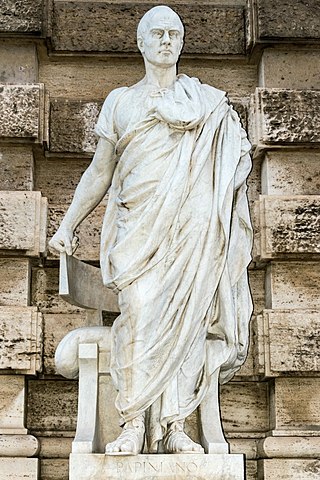Year 228 (CCXXVIII) was a leap year starting on Tuesday of the Julian calendar. At the time, it was known as the Year of the Consulship of Modestus and Maecius. The denomination 228 for this year has been used since the early medieval period, when the Anno Domini calendar era became the prevalent method in Europe for naming years.

The Breviary of Alaric is a collection of Roman law, compiled by Roman jurists and issued by referendary Anianus on the order of Alaric II, King of the Visigoths, with the approval of his bishops and nobles. It was promulgated on 2 February 506, the 22nd year of his reign. It applied, not to the Visigothic nobles who lived under their own law, which had been formulated by Euric, but to the Hispano-Roman and Gallo-Roman population, living under Visigoth rule south of the Loire and, in Book 16, to the members of the Trinitarian Catholic Church; the Visigoths were Arian and maintained their own clergy.

Gaius Messius Quintus Trajanus Decius, sometimes translated as Trajan Decius or Decius, was the emperor of the Roman Empire from 249 to 251.

Friedrich Carl von Savigny was a German jurist and historian.

Ulpian was a Roman jurist born in Tyre. He moved to Rome and rose to become considered one of the great legal authorities of his time. He was one of the five jurists upon whom decisions were to be based according to the Law of Citations of Valentinian III, and supplied the Justinian Digest about a third of its contents.
Marcus Antistius Labeo was a Roman jurist.

The Digest, also known as the Pandects, is a name given to a compendium or digest of juristic writings on Roman law compiled by order of the Byzantine emperor Justinian I in 530–533 AD. It is divided into 50 books.

Gaius was a Roman jurist. Scholars know very little of his personal life. It is impossible to discover even his full name, Gaius or Caius being merely his personal name (praenomen). As with his name it is difficult to ascertain the span of his life, but it is safe to assume he lived from AD 110 to at least AD 179, since he wrote on legislation passed within that time.
The name Herennius may refer to:

Aemilius Papinianus, simply rendered as Papinian in English, was a celebrated Roman jurist, magister libellorum, attorney general and, after the death of Gaius Fulvius Plautianus in 205 CE, praetorian prefect.
Cyrillus, Greek jurist of the 5th century, was a professor in the ancient Law School of Berytus, and one of the founders of the oecumenical school of jurists. This school preceded the succession of Anastasius to the Eastern empire, and paved the way for Justinian's legislation.
The Law of Citations was a Roman law issued from Ravenna in AD 426 by the emperor Valentinian III, or rather by his regent mother, Galla Placidia Augusta, to the Senate and the people of Rome, and it was included in both Theodosius II's law compilation of 438 and the first edition of the Codex Justinianus.
Anthony Maurice Honoré, was a British lawyer and jurist, known for his work on ownership, causation and Roman law.
Julius Paulus, often simply referred to as Paul in English, was one of the most influential and distinguished Roman jurists. He was also a praetorian prefect under the Roman Emperor Alexander Severus.
Birth certificates for Roman citizens were introduced during the reign of Augustus. Until the time of Alexander Severus, it was required that these documents be written in Latin as a marker of "Romanness" (Romanitas).
Aelius Marcianus was a Roman jurist who wrote after the death of Septimius Severus, whom he calls Divus in his excerpts from the Pandects. Other passages in the same source show that he was then writing under Antoninus Caracalla, the son and successor of Severus. It also appears from his Institutiones that he survived Caracalla. It is therefore probable that he also wrote under Alexander Severus, whose reign commenced 222 AD. Caracalla died in 217. Another Aelius Marcianus is cited in the Pandects, who was proconsul of Hispania Baetica in the time of Antoninus Pius.

Poena cullei under Roman law was a type of death penalty imposed on a subject who had been found guilty of patricide. The punishment consisted of being sewn up in a leather sack, with an assortment of live animals including a dog, snake, monkey, and a chicken or rooster, and then being thrown into water.

The gens Herennia was a plebeian family at ancient Rome. Members of this gens are first mentioned among the Italian nobility during the Samnite Wars, and they appear in the Roman consular list beginning in 93 BC. In Imperial times they held a number of provincial offices and military commands. The empress Herennia Etruscilla was a descendant of this gens.

This article lists historical events that occurred between 101–200 in modern-day Lebanon or regarding its people.










